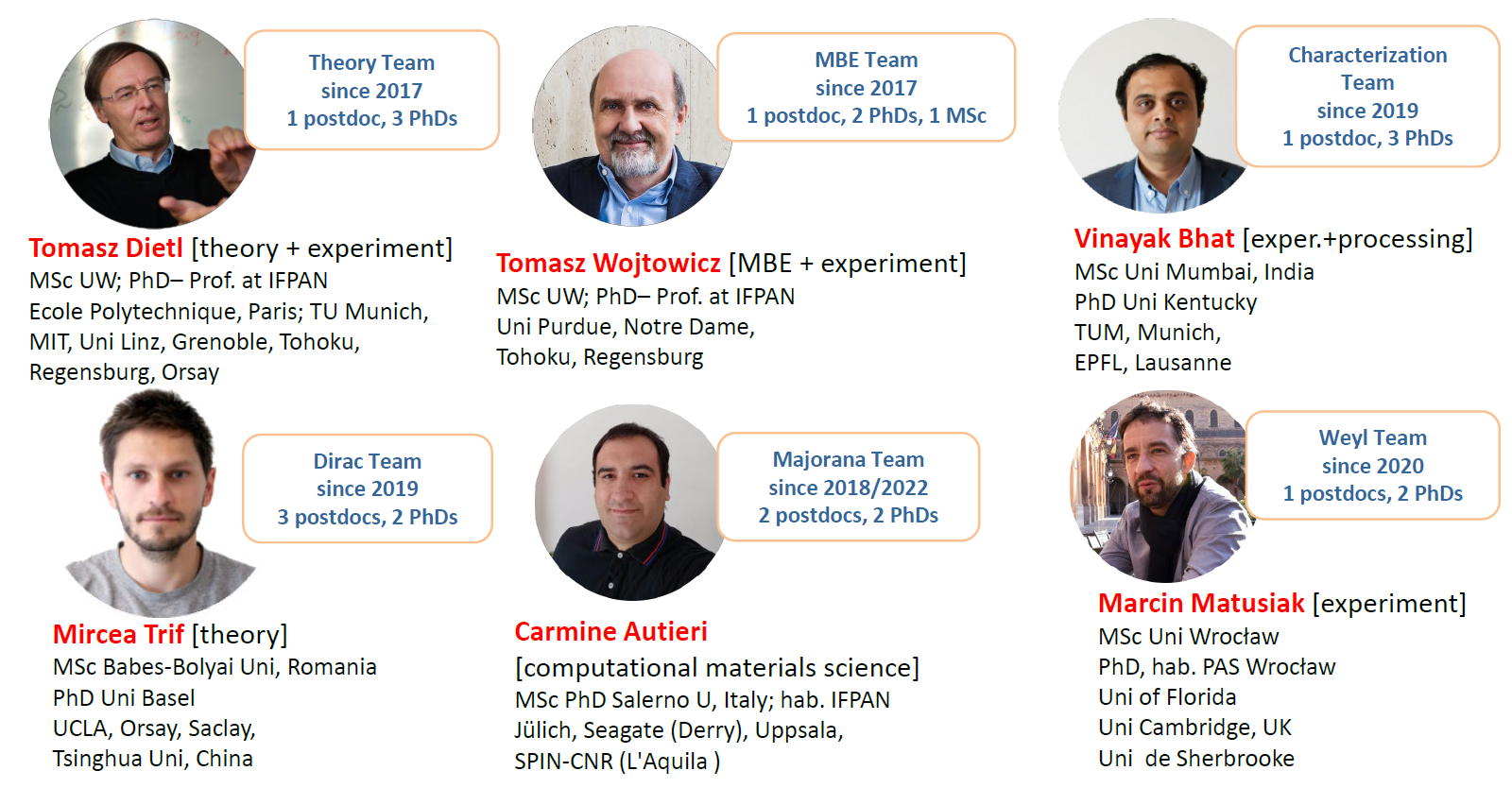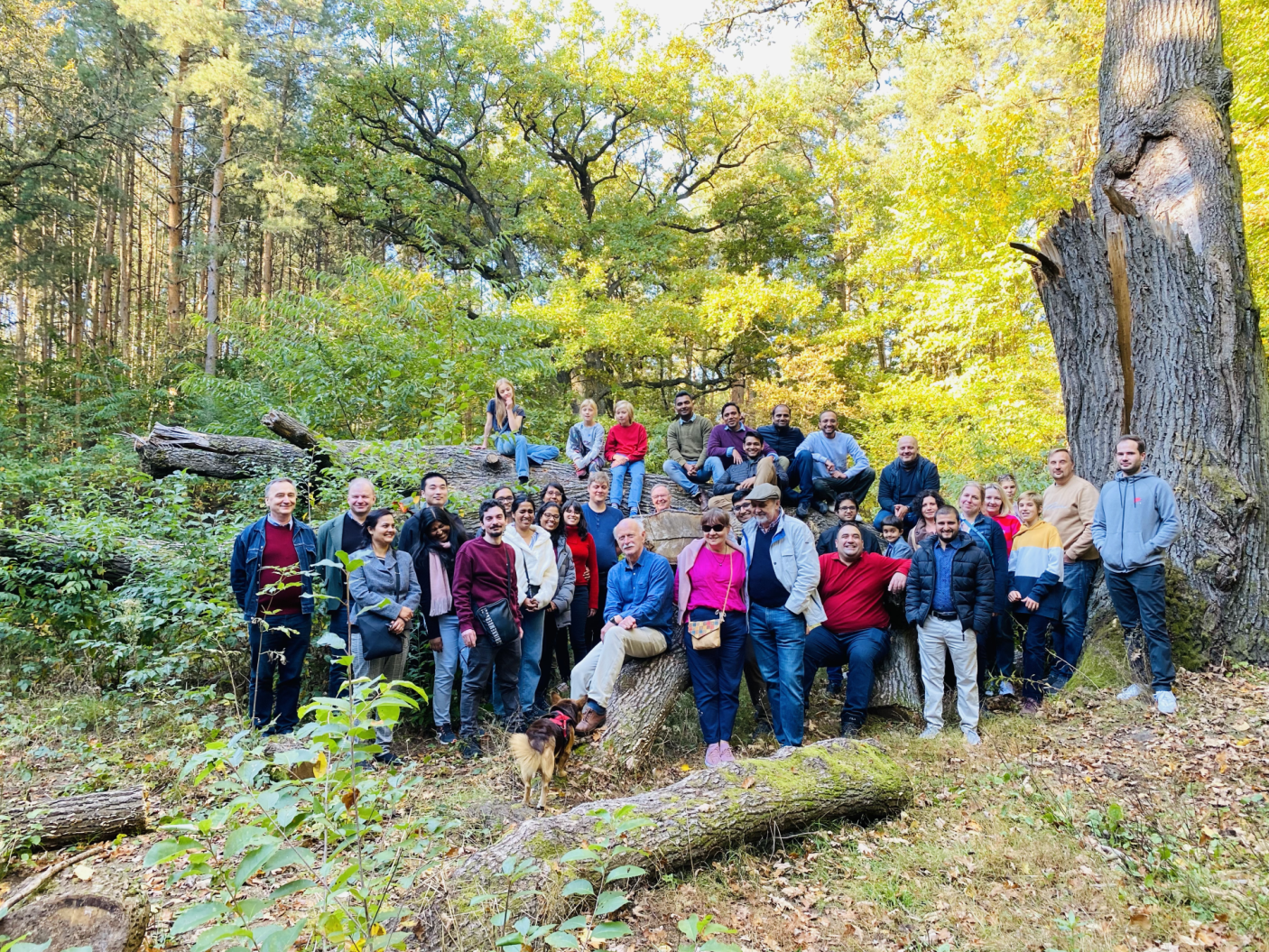
I. The core MagTop’s activity is directed to solve grand challenges of topological matter interfaced with magnetism and superconductivity, and to discover experimentally and theoretically new materials and unanticipated topology-related phenomena, which enlarge research horizons and, possibly, lead to new applications. MagTop’s motto is: “Experimental and application results inspire theory; theory inspires materials development and applications”.
MagTop operates within the International Research Agendas Programme of the Foundation for Polish Science, supported by the European Regional Development Fund under Smart Growth Operational Programme (SG OP), Priority Axis 4: Increasing the research potential, Measure 4.3: International Research Agendas (IRAs).
The IRA programme provides support for specialised, independent research units in Poland which pursue international research agendas in strategic cooperation with renowned scientific institutions from other countries. The scope of the proposed research, as well as the international standing of the project leaders, are key for the research centre’s success and its international scientific visibility. The IRAs programme is aimed at enabling the creation of research organizations (scientific units) led by scientists with considerable experience in science management as well as their own area of expertise, which have international teams of renowned scientists from different fields who conduct research in order to solve a specific global scientific challenge and apply the best international practices with regards to:
HR policy
R&D management
Commercialisation of R&D results.
Research centres implementing the IRAs programme conduct their R&D work in line with a pre-approved research agenda. According to the programme documentation the agenda has to highlight a specific scientific issue – a challenge and a means of addressing it. The challenge itself as well as the proposed means of solving it must be important enough so that the results of the research will likely be published in top scientific journals and presented at prestigious scientific meetings. The intellectual property developed over the course of the research should have the potential for legal protection and the developed solutions should be applicable. The suggested challenge must be contained within the National Smart Specialization framework.
The grant, awarded to MagTop’s Leaders Tomasz Dietl and Tomasz Wojtowicz in 2017, provided funding of forty million PLN (about 9 M€) for initial 5 years. Later, MagTop received additional financing in the amount of 8.5 million PLN (about 1.8 M€), which allows extending its operation until December 31, 2023. Furthermore, two MagTop groups obtained additional funding of about 1 M€ and 0.8 M€ for upgrading GENxplor MBE system and purchasing Variable Temperature and Magnetic Field Characterization equipment package and a microscope-base set-up for local Brillouin Light Spectroscopy (BLS). A call for proposals that could provide MagTop financial support for the next five years within the EU supported FENG Programme (European Funds for Modern Economy) was posted by the Foundation for Polish Science in May 2023
II. To date (May 2023), MagTop’s researchers have co-authored 274 articles, delivered 101 invited talks, presented 115 conference contributions, submitted two European patents, four have been published in Bulletins and one patent has been granted, and organized six international focussed meetings. Two publications and three patents have been jointly submitted with collaborating companies, two other are in a pipeline. MagTop’s community is also active in outreach activities, including teaching in the Doctoral School, and many actions for public at large with a special focus on gifted and curiosity-driven high-school students.

III. Julius-Maximilians-Universität Würzburg is MagTop’s strategic partner unit. MagTop’s employment processes and R&D activities are supervised by the International Scientific Committee (ISC) chaired by Laurens Molenkamp. As detailed in the home page www.MagTop.ifpan.edu.pl, MagTop’s forty employees have originated from thirteen countries, which constituted a game changer in the IFPAN internationalization. As shown in Graph 1, MagTop’s six groups (Theory, MBE, Characterization, Dirac, Majorana, and Weyl) are headed by leaders with extensive international experience and acclaimed accomplishments [T. Dietl (since 2017), T. Wojtowicz (since 2017), V. Bhat (since 2019), M. Trif (since 2019), T. Hyart (since 2018)/C. Autieri (since 2022), M. Matusiak (since 2020)]. The hiring procedures of team leaders, young and senior postdocs, PhD and MSc students have obeyed high standards of openness, equal opportunity, and broadly understood diversity and inclusiveness. In addition to PIs’ international experience, good practises in HR, R&D management, commercialization, and outreach have been gathered by study visits of all group leaders in the strategic partner unit University of Würzburg and, in particular, in its Institute for Topological Insulators, and by acquiring good practises from visiting other relevant centres such as Advanced Institute for Materials Research at Tohoku University, which was funded within World Premier International Research Center Initiative (WPI), and together with a parallel initiative of the Japanese Government, Top Global University, aims in modernizing and internationalizing Japanese’s academia landscape.
In accord with the implemented agenda, one of MagTop’s strengths is the molecular beam epitaxy of 2D and 1D quantum structures of topological IV-VI and II-VI compounds that can be interfaced with magnetic and superconducting materials. Another is bulk growth of top-quality single crystals of topological crystalline insulators and Weyl semimetals. The developed materials, after extensive structural and chemical characterization, and their hybrid structures with normal, superconducting or magnetic metals as well with amorphous insulators, are processed into experimental devices and studied in-house by a broad range of experimental methods, comprising charge and heat magnetotransport, magnetooptics including Brillouin scattering, magnetization, and magnetic resonances down to millikelvin temperatures and in magnetic fields up to 16 T. Theory research, oriented to propose new R&D directions and to elucidate the in-house and external experimental discoveries, is a prominent part of MagTop activities. In addition to broad national and international research collaborations that involved 43 scientific institutions on three continents, the MagTop researchers are systematic users of European large facilities, including synchrotron radiation sources (Kraków’s SOLARIS, in particular), high magnetic fields’ laboratories, and supercomputer centres, available via competitive calls.

Joint research, workshops, papers, and patent applications have been completed with industrial partners in the frame of agreements that MagTop/IFPAN signed with six companies: VIGO Photonics S.A.; PUREMAT Technologies Sp. z o.o., KrioSystem Sp. z o.o., MeasLine S.A., PREVAC Sp. z o.o., and Robert Bosch GmbH.